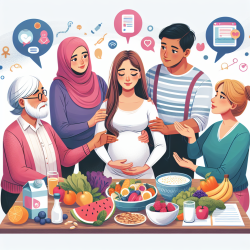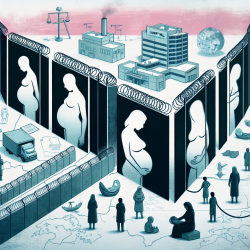Introduction
As practitioners in the field of speech-language pathology and online therapy, it is crucial to continuously update our knowledge base and apply research findings to improve outcomes for our clients. A recent study titled "Family influences on health and nutrition practices of pregnant adolescents in Bangladesh" offers valuable insights that can be leveraged to enhance the support provided to adolescents, particularly in culturally sensitive contexts.
Understanding the Study
The study conducted qualitative interviews with pregnant adolescents, adolescent mothers, family members, and health service providers in Bangladesh. The research aimed to explore the perception and support of adolescent pregnancy, dietary practices, and the roles of family members in influencing health and nutrition practices.
Key findings revealed that families play a pivotal role in the decision-making processes related to antenatal care (ANC) and nutrition. Mothers and mothers-in-law were primarily responsible for decision-making, with husbands also actively participating. However, adolescents often felt a loss of autonomy upon becoming pregnant.
Implications for Practitioners
For practitioners working with adolescents, particularly in online therapy settings, these findings underscore the importance of involving family members in the therapeutic process. Here are some strategies to consider:
- Engage Family Members: Involve family members in therapy sessions to ensure they understand the importance of supporting the adolescent's health and nutrition needs.
- Cultural Sensitivity: Be mindful of cultural norms and values that may influence family dynamics and decision-making processes.
- Empower Adolescents: Encourage adolescents to express their needs and preferences, fostering a sense of autonomy and agency.
- Address Financial Constraints: Work with families to identify resources and strategies to overcome financial barriers to accessing healthcare and nutrition.
Encouraging Further Research
While this study provides valuable insights, it also highlights the need for further research to understand the discord between family health beliefs and those of health service providers. Practitioners are encouraged to engage in or support research initiatives that explore these dynamics further, contributing to the development of more effective interventions.
Conclusion
By applying the findings from this study, practitioners can enhance their ability to support pregnant adolescents, ultimately leading to improved health outcomes. Engaging families, respecting cultural contexts, and empowering adolescents are key strategies for success.
To read the original research paper, please follow this link: Family influences on health and nutrition practices of pregnant adolescents in Bangladesh.










